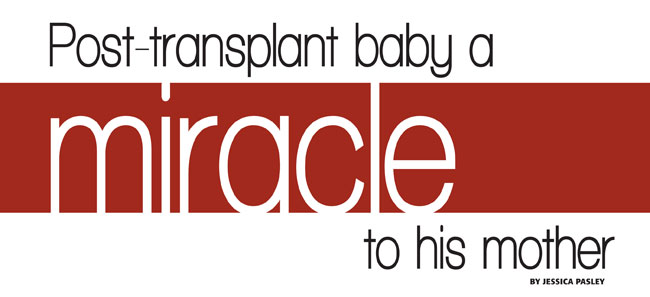Post-Transplant baby a “Miracle” to his Mother
 Traditionally, women who have undergone transplants are not encouraged to have children because of the associated risks to the mother and baby during the pregnancy. But Heidi Schaefer, M.D., a Vanderbilt nephrologist, said it is time to rethink the possibility of childbirth after transplant.
Traditionally, women who have undergone transplants are not encouraged to have children because of the associated risks to the mother and baby during the pregnancy. But Heidi Schaefer, M.D., a Vanderbilt nephrologist, said it is time to rethink the possibility of childbirth after transplant.
“Many times women who want to get pregnant post transplant are told it is too risky,” said Schaefer, assistant professor of Medicine. “I think it is important to recognize that in the right situation, pregnancy can be successful and women should not be discouraged from wanting to have a family post transplant.
“As long as my patient is in general good health with stable kidney function, I support their desire to become pregnant,” continued Schaefer. “I make her aware that we may need to adjust her anti-rejection medications prior to conception and that once pregnant, she will require close follow up with a team of doctors including a high-risk obstetrician. But more often than not, outcomes are good for both mother and baby.”
Hearing that information was a breath of fresh air to Kerrie Upchurch, 28. Diagnosed with systemic lupus at age 14, Upchurch’s condition led to end-stage kidney failure due to lupus nephritis. She knew she would need a kidney transplant someday. What she was uncertain of was her chances to become a mother.
“It wasn’t until right before I was getting married that my doctor at the time told me that I may not be able to have children and that he thought it would be a good idea to discuss that with my fiancé,” said Upchurch. “After I got married, I was getting closer and closer to needing a transplant. My needing a transplant didn’t bother me as much as the prospect of not having children.
“I had it in my mind that there was a big chance I would not be able to have children,” she said. “It was really hard hearing that, so I felt so much better after being told that there actually was a chance, that it was a possibility.”
Fertility help needed
Upchurch received her new kidney from her younger sister, Jennifer Meeks, on Feb. 19, 2008. After she recovered, she began researching her options for pregnancy.
Medications were the biggest concern and as she began the road to pregnancy, doctors closely monitored her and made adjustments to her required medications. It wasn’t an easy process, she recalled. Initially she had trouble getting pregnant and was referred to a fertility specialist.
“We decided that we would at least try the fertility route at least once and see what happened. I was really nervous about it because I had so many health problems and I wasn’t getting pregnant on my own. I wondered if it was a sign that I didn’t need to try this.
“But three months after going to the fertility clinic, I was pregnant,” she said.
Upchurch is among a growing number of women who have chosen to pursue pregnancy after undergoing a life-saving transplant.
A national transplantation registry has been created to document the cases. There have been more than 1,300 successful pregnancies post-kidney transplant since the registry was started in 1991.

“What more could you ask for?”
Upchurch is Schaefer’s third patient to get pregnant after transplant, and all have done well.
The major risks for mothers during pregnancy include hypertension, infections and risk of preeclampsia, which is characterized by high blood pressure proteinuria (protein in the urine), and worsening kidney function. Schaefer said the risk of rejection of the transplanted kidney, if monitored closely and shows stable function, is very low. Prematurity and low birthweight are the two main risks to the newborn, she added.
Mothers are cautioned against breast-feeding because of the medications they are required to take post transplant, but Schaefer said that doesn’t seem to be a big issue. All of her patients who went on to give birth are having the “normal mom experience” and moving forward in their lives.
Upchurch is no exception.
Her son Gavin was born June 3, 2010, at 37 weeks. He weighed 4 pounds and 9 ounces and was 18 inches long.
“What more could you ask for?” said Upchurch. “I think of him as a miracle baby. I have been through so much. And it wasn’t just me and Keith [her husband] who made this happen. It was a team of people. Without my sister, he would not be here. Without the doctors he would not be here. It took all of us. “And he is just so wonderful.”
Now Upchurch has a playmate for Gavin. Her sister and kidney donor, who lives a few doors down from her in Shelbyville, Tenn., had a baby of her own in January.
“I always had hope that I would someday have a family,” said Upchurch. “In the back of my mind, I always thought that anything was possible. And now, see, anything is possible.”
Leave a Response